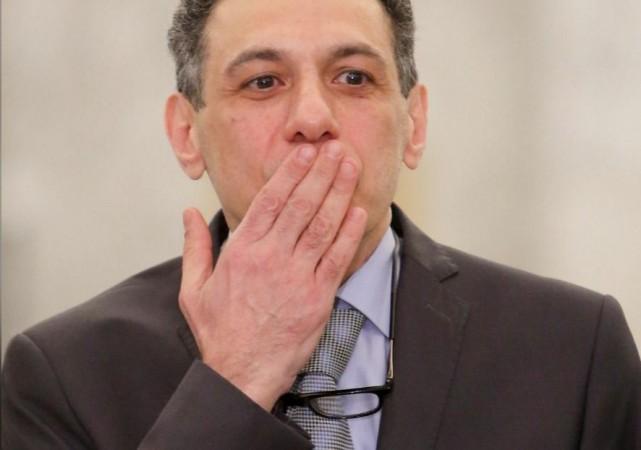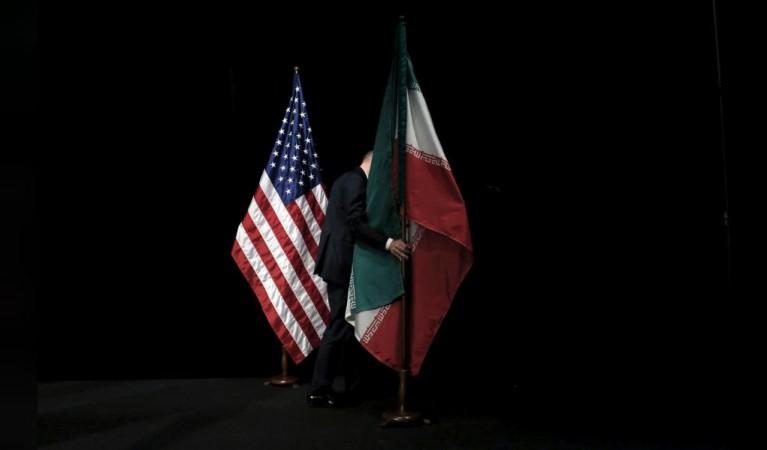
Iran's release last month of Nizar Zakka, a Lebanese businessman with U.S. permanent residency, after four years in prison was meant as an opening for US-Iranian talks, according to three Western sources familiar with the issue.
The gesture, however, was not enough for Washington, which did not pursue it.
"It was a missed opportunity," one US source said of Zakka's June 11 release and the US decision not to pursue talks. "We should have explored whether there was something there."
A second source — who is familiar with Iran's thinking and spoke on condition of anonymity — said Iran freed Zakka as a signal it wanted to cool tensions that have fueled fears of a war, and described his release as "a goodwill gesture."
"This was seen as a de-escalation step from their side, which obviously they expected to be somehow reciprocated from the American side," said the second source, adding that the United States did not take up the overture.
A State Department spokesman declined to address whether Washington had missed an opportunity to engage with Iran after Zakka's release, and said if Tehran wanted to reduce tensions it should free an American citizen.
"If Iran wants to reduce tensions and engage with the United States government, it should make a humanitarian gesture such as releasing one of the innocent American citizens it is holding hostage," the spokesman told Reuters.
Iranian officials declined to discuss whether it was an overture, or what concessions Tehran wants from Washington.
In the month since the release, already tense US-Iranian relations have taken several turns for the worse, including Iran's downing of a US drone, US economic sanctions against the Islamic Republic's supreme leader, and the capture last week of an Iranian supertanker by British forces.
The drone's destruction brought President Donald Trump to the brink of ordering the first overt US military strike on Iranian targets since 1988.
Zakka, a Washington-based information technology expert, was arrested in 2015 while attending a conference in Iran. His information technology company, IJMA3, is funded by private groups and governments, including the United States.
OPPORTUNITY?
Held at Tehran's notorious Evin Prison, Zakka staged at least six hunger strikes. He was visibly shaken when he arrived in Beirut late on June 11 accompanied by Lebanese security chief Abbas Ibrahim, who had gone to Iran to collect him.
Zakka later told the New York Times he believed his release was a conciliatory signal from Iran toward the United States.
His lawyer, Jason Poblete, represents other prisoners held in Iran and told Reuters he believes that Zakka's release "remains an opportunity for others unlawfully detained in Iran."
"With political will, it is possible. All stakeholders should weigh in more than they have on these matters," he said, referring to the United States and other world powers that agreed a nuclear deal with Iran in 2015.
Trump has pulled the United States out of the nuclear deal, tightened economic sanctions against Tehran, and built up US military forces in the Gulf.

In a measured initial response to Zakka's release, the US State Department said it was a good day for his family and hoped the move would lead to the release of Americans.
It was a rare moment of agreement between the United States and Iran, but it was not enough to change the dynamic despite Trump's stated willingness to open negotiations with Tehran.
"We are encouraged by the news that Lebanese citizen Nizar Zakka has been released by the Iranian regime and hope that this is a positive sign for Americans wrongfully detained in Iran," a senior administration official told Reuters on July 3.
Washington has demanded Iran release the Americans it is holding, including father and son Siamak and Baquer Namazi; Xiyue Wang, a Chinese-American graduate student at Princeton University who was arrested in 2016; Michael R. White, a Navy veteran imprisoned last year, and Robert Levinson, a former FBI agent missing since 2007.
Several dozen Iranians are being held in US prisons, many of them for breaking sanctions. They include Professor Masoud Soleimani, a stem cell expert who was arrested at Chicago airport in October 2018 for allegedly attempting to export biological materials to Iran in violation of sanctions.
When Zakka was freed, officials in Tehran said his release was partly due to Iran's close ties with Lebanon's Iran-backed Hezbollah movement.
'COERCIVE DIPLOMACY'
While some diplomats and analysts believe Iran badly wants negotiations to ease sanctions that have crippled its economy, it is unclear whether Washington is willing to tiptoe toward talks.
The first step, said former senior US officials, would be to try to de-escalate tensions.
One way might be for US Treasury Secretary Steven Mnuchin not to carry out his June threat to sanction Iranian Foreign Minister Javad Zarif, Tehran's prime negotiator.
Visiting New York in April, Zarif proposed a US-Iran prisoner swap and also suggested Tehran could cooperate with Washington on Afghanistan and Iraq, where neither wishes to see a return to civil war or an expansion of the Islamic State militant group whenever the United States withdraws its troops.
Former US Deputy Secretary of State Bill Burns told Reuters last month that Trump's actions since withdrawing from the nuclear deal had convinced the Iranians and US allies that the chances of a serious negotiation are increasingly remote.
"This is coercive diplomacy without the diplomacy - in other words maximum pressure not tethered to clear or realistic goals," said Burns, author of "The Back Channel," a memoir that describes the secret talks he led that paved the way to the 2015 nuclear deal.
Trump himself may be open to talks, but his administration's actions are closing the door, Burns added. "The problem is that they are boxing themselves in rather than...keeping options alive."

















